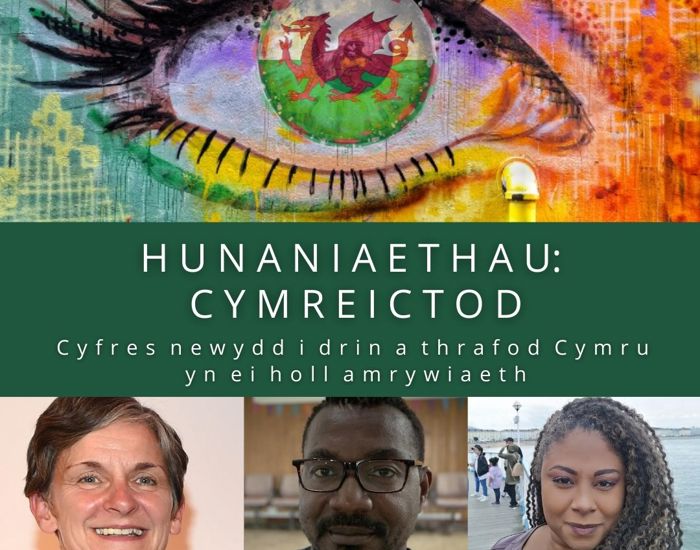During Black History Month (October 2022), the Coleg Cymraeg Cenedlaethol will launch a series of online conversations addressing national identity from diverse perspectives such as religion, race, gender, and LGBTQ+ in Wales.
As the Welsh Government introduces a new curriculum to Welsh primary and secondary schools from September 2022 that makes learning of Black, Asian and minority ethnic history; and Relationships and Sexuality Education mandatory, the series 'Identities: Welshness' will discuss identities in Wales today in all their diversity. It will include open and honest conversations and discussions with individuals from different fields, communities and organisations including teacher Natalie Jones, Professor Laura McAllister and refugee from the Ivory Coast who now works as a Welsh teacher in Wales, Joseph Gnagbo.
The first session will be on Thursday 13 October 2022 at 18:00 to mark Black History Month and the first contributor is Natalie Jones who is of Jamaican descent who moved with her family to Pwllheli from Birmingham to live when she was 9 years old.
Natalie now works as a supply teacher in West Wales, is a regular columnist with Golwg magazine, and works with the Welsh Government on the new curriculum. Her session, 'It's in my DNA', will be an insight into how she identifies herself with Welsh society, and according to Natalie, the new curriculum will teach the next generation more deeply about Welsh identity:
"Teaching black, Asian, and ethnic minority history to children in school is key to teaching children that their race, religion, and background are as important as each other. As a child growing up in Wales, I felt very lonely because no one understood why I looked different. From now on, when children from an ethnic minority background leave school, I sincerely hope they will feel that they belong to society in Wales."
The series is organised by Dr Gareth Evans-Jones, lecturer in Philosophy and Religion at Bangor University, in cooperation with the Coleg Cymraeg.
Gareth who was also responsible for the successful conference, Y Ddraig Amryliw which took place in February this year to coincide with Pride month, said:
"'Welshness as a concept is multi-layered and multi-faceted, and continues to evolve. The purpose of the 'Identities: Welshness' series is to deliver stimulating conversations about various aspects of what constitutes 'Welshness' historically, presently, and with an eye to the future."
Noam Devey, who was appointed to a new role as Equality, Diversity and Anti-Racism Coordinator within the Coleg Cymraeg this year, said:
"The Coleg is delighted to sponsor this important series as we take the Diversity and Anti-Racism agenda very seriously. Addressing issues relating to all aspects of diverse life, communities and cultures in Wales through the medium of Welsh is vital.
"The Coleg is grateful to Gareth Evans-Jones for organising the series because it reflects the Coleg's important work in highlighting diversity in Wales in terms of communities, race and religion and ensuring that everyone has the right to participate in such discussions. All are warmly welcome to attend and take part in the series."
Other speakers will include scholar and former international football player Professor Laura McAllister who has also been Chair of Sport Wales, on the board of UK Sport, and FAW Cymru. As a member and campaigner in the LGBTQ+ community in Wales she will be discussing Welsh identity around sport and the inclusivity of the LGBTQ+ community in the field. In the lead up to the World Cup in Qatar, according to Laura, the Welsh football team is leading the way with its modern and inclusive image, and the World Cup is an invaluable opportunity to reflect this to the rest of the world:
"Welsh football has successfully engaged with culturally diverse communities, effectively connecting the local with the national and the global. We have moved far from the outdated and patronising image that many of the world's citizens have of our nation. Therefore, the mystery and fascination about Wales will be fresh to audiences at Qatar 2022. Our narrative needs to be forward thinking and grounded in the values of Wales as a rainbow nation, a good global citizen with inclusive and welcoming people, diverse languages and cultures."
There will also be a session with Joseph Gnagbo, a refugee who fled the Ivory Coast in West Africa to seek asylum in Wales in 2019. Three years later, Joseph, who is now fluent in Welsh, will discuss his new identity since leaving his homeland.
There will also be sessions with members of the Muslim Council of Wales and the Welsh Buddhist Council to discuss inter-religiousism, and authors of Welsh Plural: Essays on the Future of Wales will discuss the volume which challenges the stereotype about Welshness.
The sessions run monthly online until May and are open to the public. Individuals can register to attend the sessions on the Porth website.
